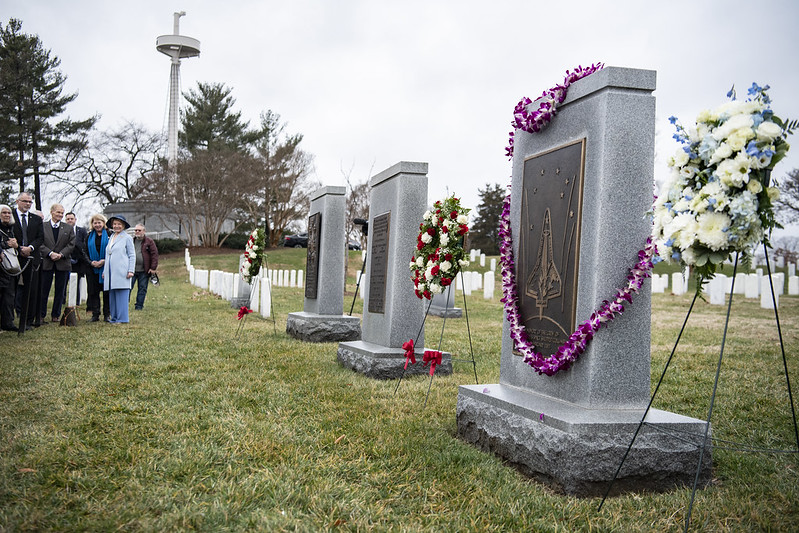Author: Jenifer Leigh Van Vleck, Ph.D.
15 found
 “
“
We are here to remember so that we never repeat the mistakes of the past,” NASA Administrator Bill Nelson told a gathering of more than 100 NASA employees, family members and friends at Arlington National Cemetery on Jan. 25, 2024, NASA’s annual Day of Remembrance. “Because of Apollo 1, Challenger and Columbia, we honor 17 souls deep in our hearts.” Traditionally held on the fourth Thursday in January, the NASA Day of Remembrance commemorates the crews of Apollo 1 and space shuttles Challenger and Columbia—all of whom are honored with monuments at ANC. The timing of the annual remembrance reflects the anniversaries of the three disasters, which happened to occur between the dates of Jan. 27 and Feb. 1.
Ida Lewis, the namesake of Arlington National Cemetery’s Lewis Drive, was once known as “the bravest woman in America.” Lewis served as an official lighthouse keeper for the U.S. Lighthouse Service (later absorbed into the Coast Guard) from 1879 until her death, at age 69, in 1911.
It is fitting that one of the most important women in American history had a birthday in March, Women’s History Month. Ruth Bader Ginsburg — Supreme Court justice, cultural icon, and indefatigable champion of gender equality — was born on March 15, 1933. She is buried in Section 5 of Arlington National Cemetery, next to her husband, Martin Ginsburg, an attorney and U.S. Army veteran.
On November 24, 1921, two weeks after he and other Medal of Honor recipients participated in the funeral of the Unknown Soldier, Colonel Charles Whittlesey boarded the S.S. Toloa, en route to Havana, Cuba from New York. At the beginning of the voyage, nothing seemed out of the ordinary. On November 26, around 11:30 PM, Whittlesey announced that he was retiring for the night. He was never seen or heard from again.
As part of Arlington National Cemetery’s new Education Program, an educational module on the history and significance of the Tomb of the Unknown Soldier is available at https://education.arlingtoncemetery.mil. The module is a resource for teachers, students and adult “lifelong learners.” It includes lesson plans, assignments and primary source readings for elementary, middle and high school students, as well as self-guided walking tours that can be used to explore the cemetery either virtually or in person. Lesson plans align with national and state social studies standards and can be easily adapted for homeschooling or virtual learning.
During National Native American Heritage Month, we are proud to honor the life and legacy of Zitkála-Ša (Gertrude Simmons Bonnin), who is buried in Section 2, Grave 4703. Zitkála-Ša, whose name means “Red Bird,” was one of the most important American Indian activists and writers of the 20th century.
On November 10, 1775, the Continental Congress authorized two battalions of Marines to be raised. Two weeks later, Samuel Nicholas was commissioned a Captain of Marines by the Continental Congress. He is traditionally regarded as the first Commandant of the Marine Corps. Read our guest blog post from the National Museum of the Marine Corps to learn more about important moments in Marine Corps history.
To commemorate Hispanic Heritage Month, as well as the recent birthday of the United States Air Force (USAF), today we honor the service of one Latino USAF veteran buried at Arlington: Hector Santa Anna, a decorated World War II B-17 bomber pilot, Berlin Airlift pilot and career military leader with a memorable last name. Santa Anna happened to be the great-great nephew of Mexican general Antonio Lopez de Santa Anna, who famously led the siege of the Alamo during the Texas Revolution of 1836. But this Santa Anna fought for the United States—beginning in the Army Air Corps during World War II and continuing with the Air Force after its establishment as an independent service branch in 1947.
On July 26, 1947, President Harry S. Truman signed the National Security Act of 1947, which created the Department of the Air Force as an independent branch of the U.S. armed services. The act went into effect on September 18, 1947, making September 18 the official birthday of the United States Air Force (USAF).
Although the Spanish-American War lasted for only a few months in 1898, the legacy of this brief yet transformative conflict is marked on the landscape of Arlington National Cemetery. Arlington has more Spanish-American War memorials and gravesites than any other single place in the United States. Learn why—and gain insights into the broader history and legacy of the Spanish-American War.